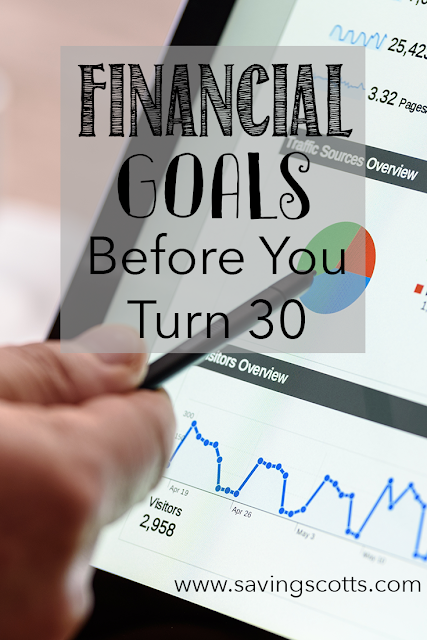1. Get out of debt.
Your twenties are likely to be the years when your first accumulate debt. Obviously the easiest option would be to never get into debt in the first place, but life doesn't always work out like that. If you are in debt purpose to become debt free by 30 allowing you to spend future years accumulating wealth rather than drowning in a sinking hole of debt.
2. Retirement savings.
It is never too early to start saving for retirement. Make sure you are taking advantage of employer contributions and tax breaks to make the most of your investments. Setting up a regular payment each month will help you to achieve this goal without feeling the pinch. We recommend contributing about 8-10% of your income towards retirement. Also if you have changed jobs, it is also a great idea to move you pension funds into a single account allowing you to manage them more easily.
3. Be bold about your career.
Your career is going to be the main source of income in your life so it is important to choose something you enjoy. Your late 20s is a great time to assess where you are in your career and if you are happy with the current trajectory. If you are not happy in your job NOW is the time to make a change. Chris started his Engineering degree at 28 having decided he was no wanting to spend the rest of his working years in sales and we know in the long term this decision will be for the better.
4. Financial independence.
Gaining financial independence from family and friends is a key. Whilst you may have relied on them to 'help you out' in the past now is the time to move away from that habit as it not only doesn't build financial independence it creates relationship problems.
5. Have an emergency fund.
Having a solid emergency fund is a valuable financial asset. This money is set aside and used ONLY in the case of emergency. As financial responsibilities become greater (i.e having a family or a mortgage) having this contingency plan becomes increasingly important. An emergency fund of 6 months of expenses (not your 6 months income) is a good benchmark to aim for.
6. Get life insurance.
Often your employer will offer some form of life insurance (or death in service). Life insurance is like your BIG emergency fund and just like an emergency fund the more financial responsibility you have the more important it is.
7. Learn how to budget properly.
Knowing how to create an effective budget and sticking to it will help give you to the tools to achieve financial goals in the future. Only through knowing where your money is going will you be able to manage and manipulate your budget to meet your needs and aims. We love using Tiller as our way of tracking our spending for budgeting purposes.
8. Live away from home.
Living away from the parents and other family is key to developing financial independence. It allows you to gain a realistic understanding of day to day costs of living and running a house. And we're not just talking about living in halls of residence where all your bills are included.
9. Stick to debit only.
Plastic is fine, but its needs to be debit all the way. With credit cards its all too easy to spend more money than you have. Whereas, a debit is more similar to spending cash. Whilst you are more likely to spend more on plastic vs cash (which makes using cash very good option) at least with debit you won't spend more than you have.
10. Be overdraft free.
Its time to kick that overdraft to the kerb and stop paying silly fees to borrow money. After all an overdraft is just another form of debt. Get out and stay out by deactivating your overdraft. Many students will take advantage of the free overdrafts available and treat it as an extension of your income what they forget is that this money will at some point need to be paid off.
11. Be open with your partner about your finances.
By 30 you are likely to be in long-term serious relationship that warrants the discussion of finances. Being open with your partner is the key to being on the same page financially. Devote time together each month to go through your budget and talk about your short and long term financial goals. Whilst one person may feel more comfortable taking charge of the budget it is important that both of you are involved in the budgeting process.
12. Be tax savvy.
Never pay more tax than you need to. This could mean taking advantage of tax free savings allowances for ISAs, pension saving bonuses or using tax free side hustles such as competitions or matched betting.
13. Make use of sinking funds.
These are savings funds for specific expenditures (such as roofs or car maintenance) that you make a regular contribution to so that when you need to spend money in those areas you use the money from their respective sinking fund.
14. Start developing passive income sources.
Being able to supplement you main income source with passive income source(s) is the best way to get intense with your financial goals. Starting a blog is a great way to introduce a passive income stream into your income.
15. Work on getting onto the property ladder.
You might not own your fist home yet (the average age in the UK is 34) but you should be working towards the financial steps necessary. These include saving for a deposit (of at least 10%), increasing your income, knowing and improving your credit score and saving for the additional costs (taxes, estate agent fees) that are associated with purchasing a property. For those in the UK making use of Help to Buy (or in April 2017) Lifetime ISAs to gain tax benefits towards saving are a great option.
What financial goals are you trying to achieve by 30?
If you are new to our blog, we are all about finding new ways for students and millennials to make and save money. Here are some of our favourite sites and products to help you out:
______________________________________________________
If you are new to our blog, we are all about finding new ways for students and millennials to make and save money. Here are some of our favourite sites and products to help you out:
- Start a blog. Blogging is our side-hustle just over a year ago we didn't think I would bring us any income . You can create your own blog here with my easy-to-use tutorial. You can start your blog for as low as $3.49 per month plus you get a free domain if you sign-up through my tutorial.
- Save money with gift cards Whether its for buying clothes, your weekly shop or dining out use Zeek (get £5 free with this link) to buy discounted gift cards to get more bang for your buck.
- Use Swagbucks for your online searches. Swagbucks is a passive way to earn gift cards. Over the course of a year you could earn $500. Swagbucks is just like using Google to do your online searches, except you get rewarded “points called SB” for the things you do through their website. Then, when you have enough Swagbucks, you can redeem them for cash, gift cards, and more. Receive $5 for signing up today.
- Try matched betting. Matched betting is a great way to may easy money online. Despite the name it is not gambling and could see you earn £500-£1000 a month for only a couple of hours work a day see here and here. For your free trial head to profit accumulator or join the Facebook 'getting started' group.
- Sign up for a cashback site like Quidco. where you can earn CASH BACK for just spending like how you normally would online. The service is free too! Plus, when you sign up through my link, you also receive a free £10 bonus!
*This post contains affiliate links, all opinions are our own*










No comments